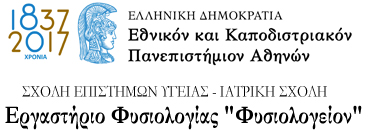Associate Professor
- HOME
- FOR VISITORS
- RESEARCH – INFRASTRUCTURE – SERVICES
- Research Laboratories
- George Kollias, Professor
- Theodoros Vasilakopoulos, Professor
- Mavragani Kleio, Professor
- Panagoula Aggelogianni, Assoc. Professor
- Christos Konsoulas, Assoc. Professor
- Athanasios Armakolas, Assoc. Professor
- Philippou Anastassios, Professor
- Mara Simopoulou, Professor of Physiology-Clinical Embryology
- Antonios Chatzigeorgiou, Assoc. Professor
- Konstantinos Palikaras, Assist. Professor
- Infrastructures
- Services
- Research Laboratories
- MEMBERS
- UNDERGRADUATE STUDY
- MASTER’S PROGRAMMES
- CONTACT

- HOME
- FOR VISITORS
- RESEARCH – INFRASTRUCTURE – SERVICES
- Research Laboratories
- George Kollias, Professor
- Theodoros Vasilakopoulos, Professor
- Mavragani Kleio, Professor
- Panagoula Aggelogianni, Assoc. Professor
- Christos Konsoulas, Assoc. Professor
- Athanasios Armakolas, Assoc. Professor
- Philippou Anastassios, Professor
- Mara Simopoulou, Professor of Physiology-Clinical Embryology
- Antonios Chatzigeorgiou, Assoc. Professor
- Konstantinos Palikaras, Assist. Professor
- Infrastructures
- Services
- Research Laboratories
- MEMBERS
- UNDERGRADUATE STUDY
- MASTER’S PROGRAMMES
- CONTACT

Physiology, Semester 3
Aim
At the end of this course, which is delivered by both lectures and practicals, students will be able to describe mechanisms underlying the function of the following physiological systems of the human body:
- Endocrine system – Reproduction
- Blood – Immune system
- Musculoskeletal system
- Metabolism
- Thermoregulation
General teaching goals
This course aims to provide knowledge about cellular physiology and the physiological functioning of specific systems (see above) of the human body.
General:
This course falls under the subjects of Physiology of the Endocrine System, Reproduction, Blood, the Immune System, Musculoskeletal System, Metabolism and Thermoregulation.
This course also includes laboratory-based teaching on the function and regulatory mechanisms of the above systems.
Content Overview:
INTRODUCTION TO MODERN PHYSIOLOGY – THE CELL: MEMBRANE COMMUNICATION – CELL: ENERGY-METABOLISM – HORMONES RECEPTORS-HORMONAL ACTION-HORMONAL REGULATION HYPOTHALAMIC/PITUITARY AXIS – PITUITARY – HORMONES – BONE FORMATION-REMODELLING – BLOOD CALCIUM REGULATION HORMONES – THYROID FUNCTION – PANCREATIC FUNCTION – ADRENAL FUNCTION – METABOLISM – FEMALE REPRODUCTIVE FUNCTION – MALE REPRODUCTIVE FUNCTION – SPERMATOGENESIS– FERTILISATION – IMPLANTATION – SEX DETERMINATION – GESTATIONAL STAGES – MUSCULOSKELETAL PHYSIOLOGY – MUSCLE CONTRACTION – NEUROMUSCULAR SYNAPSE – PHYSIOLOGY OF EXERCISE – THERAPEUTIC EXERCISE – BONE MARROW-HAEMOPOIESIS– Fe METABOLISM – RBC-WBC-DIFFERENTIAL ESR– PLATELETS-COAGULATION – IMMUNE SYSTEM –PHYSIOLOGY OF INFLAMMATION – THERMOREGULATION
Practicals:
Functional, clinical and laboratory responses and adaptations of the above systems to various physiological stimuli and changes in body homeostasis. Comparison with pathophysiological responses.
Αρχεία/downloads
© Copyright 2008-2023 Εθνικό και Καποδιστριακό Πανεπιστήμιο Αθηνών • powered by Nevma

